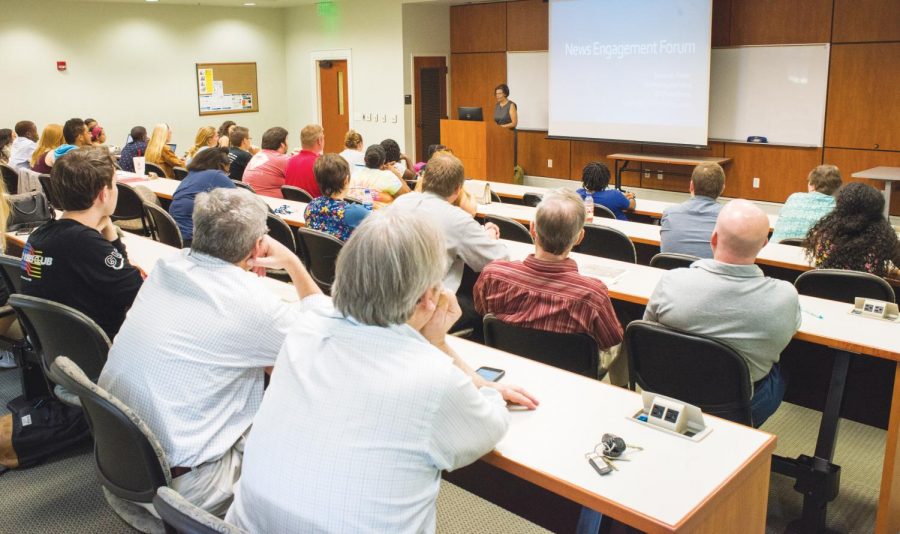Potter prices three c’s of journalism
Photo by: Contributed Photo
FMU students and faculty gather to hear veteran journalist Deborah Potter at news engagement day.
Veteran journalist Deborah Potter spoke at FMU’s annual news engagement forum on Oct. 1 in the Lee Nursing Building about the state of journalism today.
In her career, she worked as a correspondent for CBS and CNN for over a decade and founded “NewsLab,” a non-profit journalism resource center.
Potter said she wanted to discuss issues journalists are facing today rather than look to the past, emphasizing how a journalist’s role remains the same in the face of new problems and growing public distrust.
According to Potter, courage, clarity and commitment in journalism are paramount because of the difficulties of the job from attempts to undermine the press, leading several journalists to quit because of how the public negatively perceives them.
“It’s always been hard to be a journalist,” Potter said. “It’s hard now and I think maybe it’s even harder.”
Potter said since so much is entailed in the profession and it is often fraught with conflict, she wanted to make a point about how it is protected in the Constitution.
“There is a reason that the First Amendment protects only one profession: that’s our profession,” Potter said. “It’s because this country was founded on the idea that an informed citizenry is essential to democracy. They’re going to get that information from a free, unrestricted, unfettered news media. The idea is that a free press is going to be the best source of information for people to make decisions upon.”
Potter said courage is exemplified in journalism in cases where reporters can question the existing story and give a platform for different sides. As an example, she played a video where a boy whose family home had been wrongly invaded by the police was treated roughly, which led to changes in how the police are supposed to handle situations involving children.
According to Potter, since some people are quick to question the validity of a journalist’s work, it’s important for them to have clarity in their process and in the way they correct mistakes.
“The point is to make it clear to the audience that we’re serious and we want to get it right,” Potter said. “When we do get something wrong, we should say we’re sorry. I believe by correcting what you get wrong you actually earn trust; you don’t lose it. Better that you should admit it, and if you have the time, explain it.”
Potter also said commitment is valuable for following through on stories and involving the audience.
“There’s some great stories out there, and enlisting your community and making a commitment to find the answer, it’s a great way to do good journalism,” Potter said. “And I guess, fundamentally, it’s caring. Caring about the story, caring enough to triple-check so that you get it right, caring enough to take responsibility when you get it wrong and caring about the people who give you access to their lives so that you can tell their stories. It’s a real privilege.”
David Baxley, assistant professor of mass communication, said news engagement is part of the mass communication department’s mission, so they bring in professionals who can speak about the content they discuss in class.
“I think she reinforced the messages in the various courses that we have; it’s the same things we talk about,” Baxley said. “Having someone come in who was a network correspondent and who’s been in journalism for 20 to 30 years, it helps students understand how important it is to follow those foundations. I think she brought up some really valid points that our students can take with them on their journey if they want to become a journalist.”
